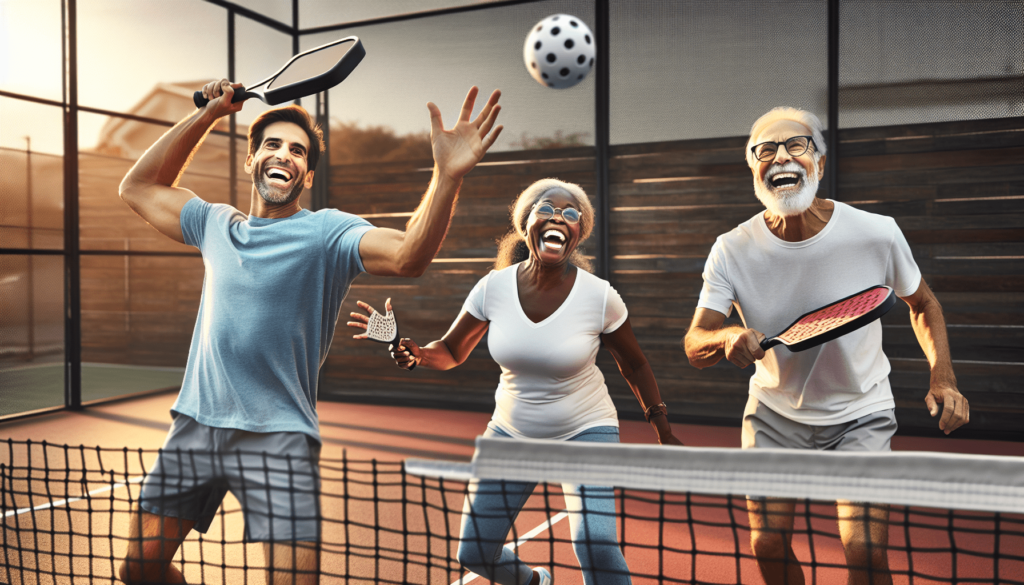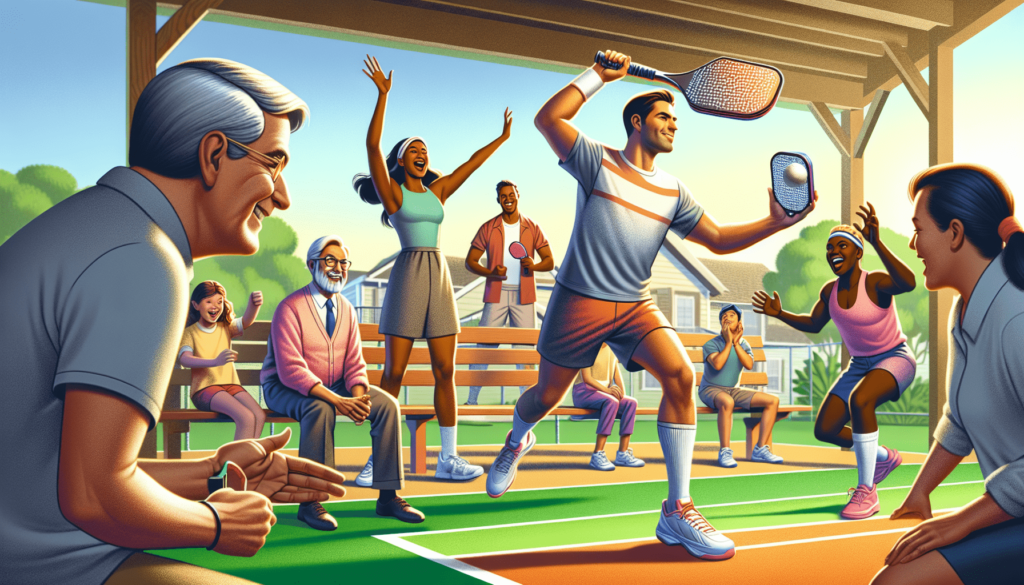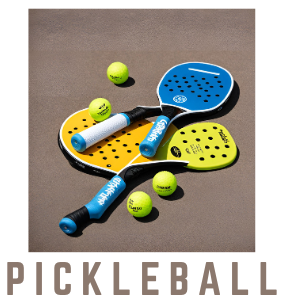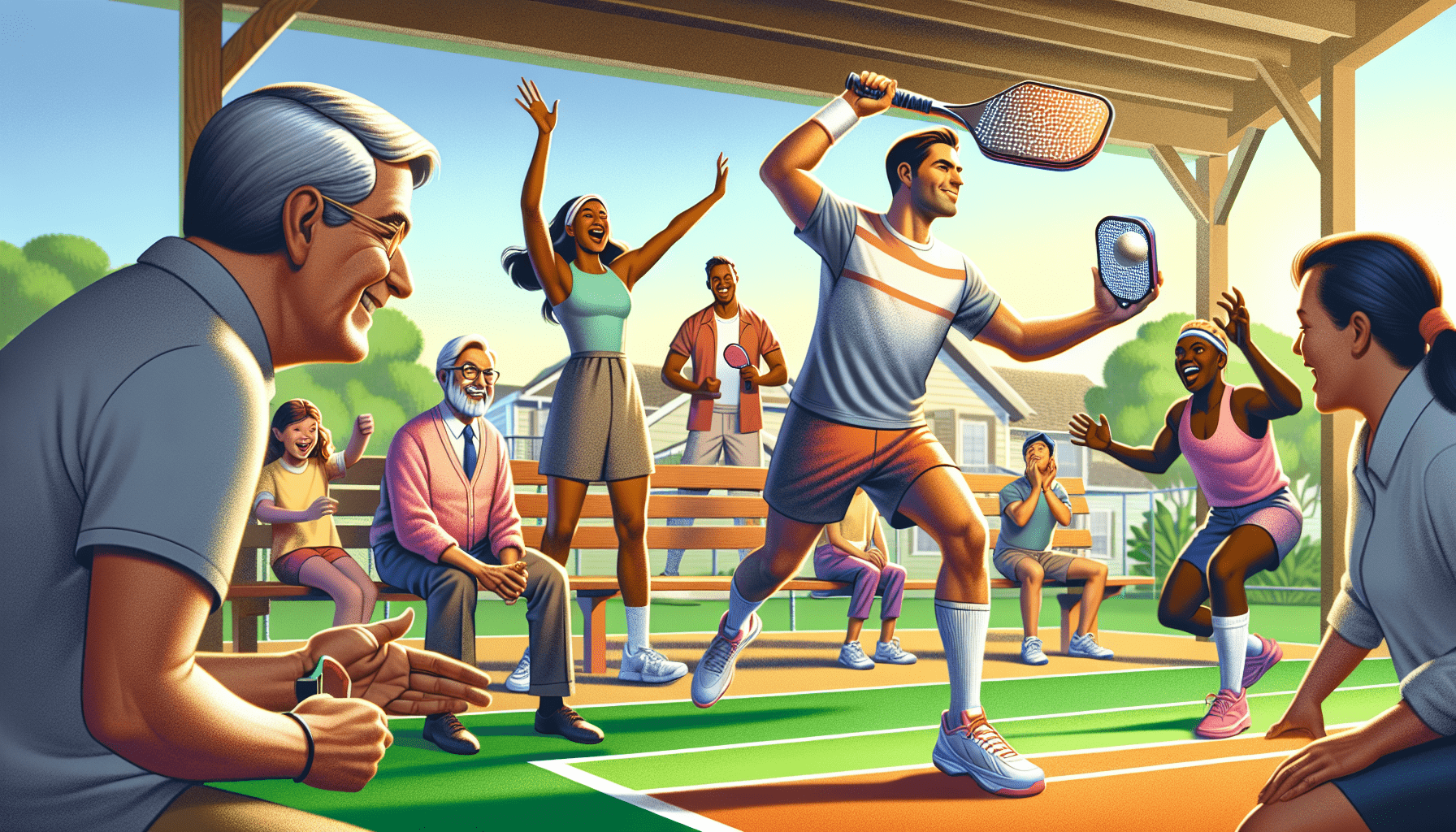Imagine a lively game that combines elements of tennis, badminton, and ping pong. Now, picture players of all ages, from youngsters to retirees, eagerly engaging in this fast-paced activity. So, is pickleball an old person sport? Contrary to popular belief, pickleball is not exclusively reserved for senior citizens.
This article explores the misconception surrounding the sport and illuminates its newfound popularity among people of all ages. So, put aside any preconceived notions and prepare to be enthralled by the world of pickleball.

Overview of Pickleball
Pickleball, a fast-growing sport that combines elements of tennis, badminton, and ping pong, has gained immense popularity in recent years. It is played on a court divided into halves, with players using solid paddles to hit a perforated plastic ball over a net.
The game is easy to learn, making it accessible to people of all ages and skill levels. Pickleball, created in the mid-1960s, pickleball originated from a family’s desire to create a fun activity for their children. Since then, it has evolved into a sport enjoyed by millions across the globe.
Misconceptions About Pickleball
Association with Older Adults
One common misconception about pickleball is that it is primarily played by older adults. While it is true that many seniors have embraced the sport, pickleball has also gained a following among people of all age groups. The inclusive and welcoming nature of the pickleball community has contributed to its popularity among seniors.
Additionally, the sport’s low-impact nature makes it appealing to individuals with mobility issues or those looking for a less strenuous activity. However, it is essential to recognize that pickleball is not exclusive to older players and offers enjoyment and benefits to people of all ages.
Perception as a Low-Impact Sport
Another misconception surrounding pickleball is that it is a low-impact sport lacking physical intensity. While pickleball may not be as physically demanding as some other sports, it still provides a great workout. The constant movement, hand-eye coordination, and agility required in pickleball contribute to improved cardiovascular health and overall physical fitness.
The sport may be less demanding on joints compared to high-impact activities like running, but it still offers a challenging and engaging exercise experience.
Comparisons with Other Sports
Some people mistakenly compare pickleball to tennis, assuming that the former is merely a watered-down version of the latter. However, while they share similarities, pickleball has its own unique characteristics that set it apart as a standalone sport.
The smaller court size, underhand serve, and different equipment used in pickleball create a distinct playing experience. It is important to appreciate pickleball for its own merits rather than dismissing it as a lesser version of tennis or any other sport.
Pickleball Demographics
Age Distribution of Players
While pickleball initially gained traction among older adults, the demographics of players have diversified significantly over time. While older adults still make up a significant portion of the pickleball community, there has been a surge in participation among younger generations.
Many families now engage in pickleball together, bridging the gap between age groups and fostering intergenerational bonding. The sport’s adaptability and accessibility have attracted people of all ages, resulting in a diverse and vibrant pickleball community.
Influence of Older Adults
Despite the growing presence of younger players, older adults continue to play a vital role in the pickleball community. Their enthusiasm, experience, and commitment have helped propel the sport’s popularity. Older players often serve as mentors and provide guidance to newcomers, fostering a supportive and inclusive environment.
Their involvement has also led to the establishment of pickleball clubs, tournaments, and leagues catered to all age groups, contributing to the overall growth and development of the sport.
Increasing Participation of Younger Generations
With the rise of pickleball’s popularity, there has been a surge in younger players taking up the sport. The appeal of pickleball lies in its fun and social aspects, making it an attractive recreational activity for children, adolescents, and young adults.
Schools and community centers have recognized the value of promoting pickleball as a means to encourage physical activity and social interaction among younger generations. As a result, more young players are embracing pickleball, ensuring the sport’s longevity and continued growth.
Benefits of Pickleball for Older Adults
Low-Impact Nature and Reduced Injury Risk
Pickleball’s low-impact nature makes it an ideal sport for older adults who may have joint issues or prefer a gentler form of exercise. Compared to high-impact activities like running or basketball, pickleball provides a more forgiving environment, reducing the risk of injuries.
The slower pace and smaller court size allow older players to enjoy the game without exerting excessive strain on their bodies, making it a safe and enjoyable option for maintaining physical well-being.
Cardiovascular Health and Physical Fitness
Despite its low-impact nature, pickleball offers an excellent cardiovascular workout. The constant movement, quick reflexes, and dynamic gameplay contribute to improved heart health and enhanced physical fitness.
Regular participation in pickleball has been shown to increase stamina, strengthen muscles, and improve overall endurance. For older adults, engaging in pickleball can be an effective way to improve cardiovascular health while enjoying a social, recreational activity.
Social Interaction and Mental Stimulation
One of the significant benefits of pickleball for older adults is the opportunity for social interaction and mental stimulation. The sport encourages connections and friendships to form among players, fostering a sense of community.
The social aspect of pickleball can combat feelings of loneliness and isolation often experienced by older adults. Additionally, the mental challenges involved in strategizing shots, anticipating opponents’ moves, and maintaining focus during gameplay provide cognitive stimulation, helping to keep the brain active and engaged.

Competitive Pickleball
Professional Tournaments and Leagues
Pickleball is not just a recreational pastime; it also has a competitive side. Professional tournaments and leagues have emerged, attracting top players from around the world. These events showcase the highest level of pickleball skills and provide an opportunity for players to compete on a larger stage.
The competitive aspect of pickleball has elevated its profile as a legitimate sport and fueled the passion of dedicated players looking to test their abilities and push themselves to excel.
Skill Levels and Competitiveness
Pickleball offers skill-based divisions and ratings, allowing players to compete within their respective levels of ability. From beginners to advanced players, there is a place for everyone to enjoy competitive pickleball.
This ensures fair and balanced gameplay, pitting players of similar skill levels against each other. The competitive aspect of the sport motivates players to improve their skills and provides a sense of achievement as they progress through different skill divisions.
Representation of Different Age Groups
Pickleball’s competitive landscape reflects the sport’s inclusivity and appeal to all age groups. Tournaments and leagues often feature divisions specifically for different age categories, such as 40+, 50+, and 60+, allowing players to compete against others within their age range.
This emphasis on age-specific divisions ensures a level playing field and recognizes the unique skills and abilities of players in various stages of life. By providing opportunities for players of different generations to compete against one another, pickleball promotes intergenerational engagement and fosters connections across age boundaries.
Pickleball as a Family Activity
Intergenerational Bonding
Pickleball’s versatility and adaptability make it an ideal activity for families to enjoy together. Regardless of age or skill level, pickleball can be played and enjoyed by the entire family. Parents, grandparents, and children can share the court, fostering intergenerational bonding and creating lasting memories. The sport provides a unique opportunity for different generations to connect, learn from each other, and engage in healthy, active recreation as a family unit.
Adaptability for All Ages and Skill Levels
Pickleball’s ability to cater to players of all ages and skill levels sets it apart as a family-friendly activity. The sport’s rules and equipment can be easily modified to accommodate younger children or individuals with physical limitations, ensuring everyone can actively participate.
The smaller court size and slower pace of the game make pickleball accessible to beginners and less physically demanding for children and older family members. This adaptability allows families to play together and enjoy the benefits of physical activity and quality time spent together.
Growing Number of Family-Oriented Pickleball Events
Recognizing the growing interest in family-focused activities, pickleball events and tournaments that highlight intergenerational play are becoming more commonplace. Family-oriented pickleball events often feature divisions or brackets specifically for different family groups, encouraging siblings, parents, and grandparents to team up and compete against other families.
These events promote a sense of camaraderie, healthy competition, and shared experiences among families, strengthening the overall pickleball community.
Health and Fitness Benefits of Pickleball
Improving Balance, Coordination, and Agility
Pickleball pushes players to develop and enhance their balance, coordination, and agility. The sport requires precise footwork and quick reflexes to reach shots and position oneself effectively on the court.
This constant movement and the need to react swiftly to opponents’ shots contribute to improved balance control, hand-eye coordination, and overall agility. Engaging in pickleball regularly can lead to enhanced physical skills that translate into improved performance in other sports and daily activities.
Caloric Expenditure and Weight Management
Pickleball provides a significant caloric expenditure, making it an effective activity for weight management. The combination of aerobic exercise and muscle engagement in pickleball leads to increased calorie burning.
The fast-paced rallies and continuous movement throughout the game help elevate heart rate and metabolism, aiding in weight loss or maintenance. Additionally, the enjoyable nature of pickleball encourages regular participation, contributing to long-term weight management goals.
Joint Mobility and Flexibility
Unlike high-impact sports that can put stress on joints, pickleball’s low-impact nature offers an opportunity for individuals to improve joint mobility and flexibility. The controlled movements involved in pickleball, such as lunges and reaching shots, promote a wider range of motion in joints.
Regular play can help maintain joint flexibility and reduce the risk of stiffness or discomfort commonly associated with aging or sedentary lifestyles. The activities performed during pickleball contribute to overall joint health, making it a beneficial exercise for individuals of all ages.
Pickleball Community and Culture
Inclusivity and Supportive Environment
One of the most remarkable aspects of pickleball is its inclusive nature and supportive community. The sport welcomes players of all ages, backgrounds, and skill levels, fostering an environment of camaraderie and acceptance.
The pickleball community often goes above and beyond to ensure newcomers feel welcomed and supported, offering guidance, advice, and encouragement. This sense of inclusivity and support leaves a lasting impression on players, creating a positive and welcoming atmosphere in which individuals can thrive and enjoy the sport.
Friendships and Camaraderie
Pickleball not only provides physical and mental benefits but also cultivates lasting friendships and camaraderie. Playing regularly allows individuals to form connections with fellow players, ultimately creating an extended pickleball community.
Shared experiences on the court foster bonds that often extend beyond the game, leading to social gatherings, group outings, and even lifelong friendships. The pickleball community, with its emphasis on fun, sportsmanship, and relationships, adds an extra layer of enjoyment to the sport.
Volunteerism and Giving Back
The pickleball community is known for its active involvement in volunteer work and charitable efforts. Players often contribute their time, resources, and skills to support various causes and initiatives. Whether organizing fundraising tournaments, offering free clinics to underprivileged youth, or assisting in community outreach, pickleball players demonstrate a strong commitment to giving back.
The sport’s culture of community engagement and philanthropy further nurtures a sense of purpose and fulfillment among players, extending beyond the boundaries of the pickleball court.
Pickleball for All Ages and Abilities
Adaptations for Individuals with Physical Limitations
Pickleball’s versatility and adaptability make it accessible to individuals with physical limitations or disabilities. The sport can be modified to accommodate specific needs through the use of adapted equipment or adjusted rules.
Wheelchair pickleball, for example, allows individuals with mobility challenges to participate fully and enjoy the game. Many organizations and clubs offer specialized programs and opportunities for individuals with physical limitations, ensuring that pickleball remains an inclusive and engaging activity for everyone.
Benefits for Children and Adolescents
Pickleball offers numerous benefits for children and adolescents, both physically and mentally. By engaging in pickleball, young players can develop hand-eye coordination, motor skills, and spatial awareness. The sport promotes physical fitness, encourages healthy competition, and instills discipline and sportsmanship values.
Additionally, pickleball provides a social environment where children and adolescents can learn teamwork, communication, and build self-confidence. The skills acquired in pickleball can transcend the court and positively impact various aspects of a young person’s life.
Growing Participation in Schools and Community Centers
As awareness of pickleball’s benefits spreads, more schools and community centers are incorporating the sport into their physical education programs and recreational activities. Pickleball’s adaptability, accessibility, and inclusive nature make it an excellent choice for introducing students to a sport that they can participate in throughout their lives.
Schools and community centers recognize the value of providing a range of physical activities, and pickleball’s popularity among all age groups makes it an appealing option for promoting health, fitness, and social engagement.
Is Pickleball An Old Person Sport?
Pickleball has come a long way from its origins as a backyard game, growing into a widely recognized and beloved sport enjoyed by millions across the globe. It is not solely a sport for older adults but a game that appeals to individuals of all ages and abilities. The misconceptions surrounding pickleball as an “old person sport” fail to recognize the sport’s inclusivity, physical benefits, and the strong sense of community it fosters.
By embracing pickleball’s versatility, adaptability, and intergenerational appeal, we break free from stereotypes and encourage cross-generational engagement, solidifying pickleball’s position as a lifetime sport with enduring appeal. So, grab a paddle, step onto the court, and experience the joy of pickleball for yourself!

